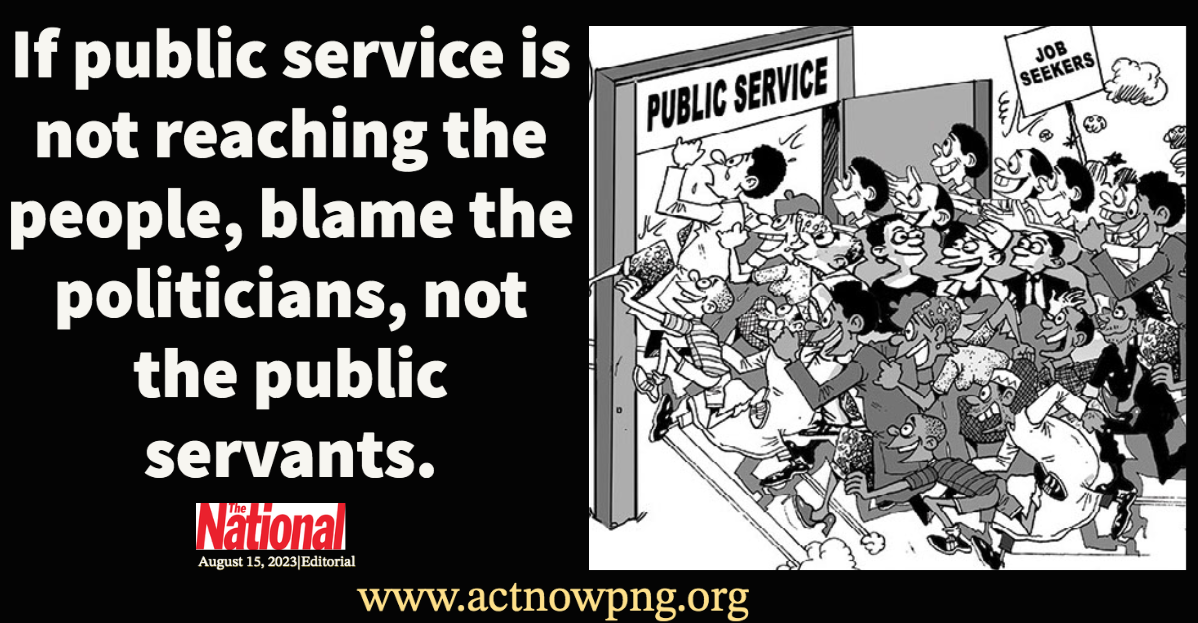
The National | Editorial, August 15, 2023
The public service is much aligned as a huge creature of pre-independence origin with tentacles reaching into every part of this country and affecting every aspect of life.
It is said this gigantic creature gobbles up a third of the national budget.
It is also blamed for the dire lack of goods and services delivery in the rural areas of PNG.
We say it is this creature that provides what little education and health services that remained in the out-backs.
It provides extension services for farmers and the odd policeman in the outstations in some of the remotest posts in the land.
How effective it does not fall to itself because, unlike a mega-corporation, it makes no money from its own survival and expansion at its own behest.
Indeed, it does not pay itself and all its operations are funded by the authority of another entity.
The public service is directly and wholly dependent on the political will of the executive government and ultimately upon a parliament comprised entirely of politicians for its sustenance through the national budget. Its leadership is chosen by the National Executive Council and that leadership is given its duty statement or key performance indicators (KPIs) by the Government. If the public fails to deliver because of resource shortfalls, it stands to reason that the blame must lie with the politicians.
If it lacks training the fault lies with the politician. If it is too large the fault lies with the politician.
And yet over the years the politician has turned around and blamed the public servants for the failure to deliver goods and services. And the public service like some dumb fat child takes the blame, bows its head, and whimpers. It dares not to fight back.
The public service was blamed for the failure to deliver on the provincial government system with the result that the law was changed and replaced with the Organic Law on Provincial and Local Level Governments in 1995 after 19 years in operation.
But it was the politician, not the public servant who in October 1976 made the first amendment to the Constitution to forcefully introduce provincial government.
It was the politician who in 1977 decided that provincial governments are to be available to all provinces and not those that wished to have it or were ready to have them, The Organic Law on Provincial and Local Level Governments did not produce the result that was expected of it and after another 19 years, in 2014 the politician blamed the public servant again and by- passed him altogether with the introduction of another law called the District Development Authority Act.
This law for the first time inserted the politician directly as a goods and services delivered by placing the local member as the chairman of the District Development Authority. It is now 9 years since the introduction of that law which saw the disappearance of K1.2 billion per year in K10 million lots to each electorate. If you did the math and all the money was distributed as budgeted, then each electorate should receive K90 million already. What has been the result?
In most electorates, there is very little evidence of the passage of the K90 million.
Politicians are now another Organic Law to replace the 1995 Organic Law on Provincial and Local Level Government. It should be clear to all by now who the real culprit of the failure of the goods and services delivery mechanism is. The public servant is a servant of both the people and the politician.
The politician is the master of both public servants and the people because he controls the law-making apparatus and the goods and services delivery machinery because he controls the money bag.
That is where the buck stops and the quicker the people and especially the public servant realize that, the quicker the departure from established processes and procedures in delivery will be arrested and set right in again.
